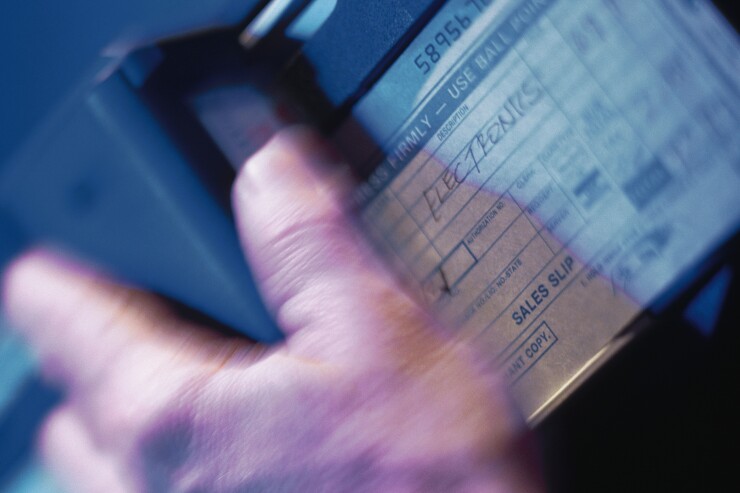Before Hurricane Florence hit the U.S. this month, certain merchants prepared by stocking up on an unlikely item in the digital payments era: 1970’s-era carbon paper credit slips.
Whenever disasters threaten to cut off power and telephone lines, General Credit Forms in Earth City, Mo., sees a flurry of orders for the manual credit card processing supplies the company has manufactured since 1973, according to John McCormick, vice president at the family-owned company.
“When hurricanes and floods are forecast in Georgia or the Carolinas, we usually get calls to ship out materials so merchants can keep processing transactions even if their telephone and power goes out,” McCormick said.

Several orders came in on the eve of the recent hurricane from merchants, with and without requests for a flatbed or “knuckle-buster” machine GCF also sells, McCormick said.
“Demand for the flatbed machines is usually pretty low, but we just shipped out a bunch ahead of the hurricane,” he said.
In its heyday in the 1970s, GCF shipped billions of the carbon paper slips annually to merchants and banks, in two sizes: a longer version typically used at stores and restaurants, and a shorter version used by gas station merchants, according to McCormick.
The forms are still shaped like the original computer data cards they mirrored, which were essential in early credit card processing, an error-prone process where receipts were manually fed into computer systems.
“Truckloads of these card slips went out every day,” he recalled, noting that his father purchased the business in 1975 when he was 7 years old.
Demand remained strong until 1980 when the first electronic payment terminals began to appear, and gradually merchants’ use of paper card slips tapered off, McCormick said. As payment terminals gained popularity in the 1980s, GCF bought out several paper credit slip producers, until it became the last large producer of the forms.
Last year GCF shipped 1.5 million of the long slips used by stores and restaurants, and hundreds of the manual card-processing machines, said McCormick, who is one of four siblings still active in their father’s business near St. Louis.
Because all card transactions are subject to Payment Card Industry Data Security Standards, manually imprinted transactions don’t pass muster because card information isn’t shielded. But many merchants like them as a backup in case POS systems fail, he said.
“They like to keep a record of the transaction in a format that will help them in case of a chargeback, and most are only using these slips in emergencies,” McCormick said.
As demand for paper card slips dwindled, GCF diversified by providing supplies for the payment terminals that cannibalized its original product. A significant amount of the company’s business today is based on producing the tiny rolls of paper electronic terminals consume when printing receipts.
“We were always in the paper business, but we switched to different types of forms and papers as times changed,” McCormick said.
Though GCF sells only a fraction of its original volume of payment slips, the combination of demand for its various forms and equipment in North America, the Caribbean and Mexico drives a steady business that employs 150 people, he said.
“We have several patents on our forms and we’ll continue to manufacture them for the foreseeable future, because many merchants wouldn’t dream of being without a backup system,” McCormick said.





